 When you actually talk to John Bunt, it’s me-groups-legal-pitfalls-with-postingshard to imagine him getting so angry about a Usenet group flame session, as to take the other parties to court. But he did. He also took their ISPs to court for carrying their libels.
When you actually talk to John Bunt, it’s me-groups-legal-pitfalls-with-postingshard to imagine him getting so angry about a Usenet group flame session, as to take the other parties to court. But he did. He also took their ISPs to court for carrying their libels.
The case isn’t settled, yet, but the case against the ISPs was thrown out, on the grounds that ISPs are not “publishers” – a complicated shift in the way the digital age views these things. Time was, when WH Smith refused to carry copies of Private Eye because to carry a publication containing a libel is to be guilty of that libel.
 That dates back to a Noble Lord of the 19th century, who won a libel action against a book, causing the publisher to be convicted. Some years later, he found a second hand copy of that book in a second hand book shop, and sued them – and won. This meant that people sued WH Smiths – not because they disliked the bookseller, but because Private Eye was poor, and WH Smith had plenty of money.
That dates back to a Noble Lord of the 19th century, who won a libel action against a book, causing the publisher to be convicted. Some years later, he found a second hand copy of that book in a second hand book shop, and sued them – and won. This meant that people sued WH Smiths – not because they disliked the bookseller, but because Private Eye was poor, and WH Smith had plenty of money.
Bunt’s case means that we now know the law, in the UK, on ISPs and libel. It doesn’t mean that the law is simple, or easy to understand! The case of Godfrey vs Demon back in 2000 means that if you are an ISP who knows about a libellous posting, and someone can prove you knew about it, then you have a choice: take it down, and escape legal penalty – or leave it there, and become a publisher.
![]() I spent some time chatting to Bunt after the case, and he says that he’s not a vindictive man – which isn’t much surprise, perhaps. But what’s interesting, is that he says he doesn’t think the people he’s suing are, either.
I spent some time chatting to Bunt after the case, and he says that he’s not a vindictive man – which isn’t much surprise, perhaps. But what’s interesting, is that he says he doesn’t think the people he’s suing are, either.
“When this latest thing started, my friends and I assumed that it was a bunch of kids, winding us up, and getting out of hand,” he said. It seems they aren’t; they are adult, savvy people who seem, somehow, to have spurred each other on to greater and greater excesses. It seems that at least one of them actually became so heated, he refused to accept a legal injunction to stop repeating the alleged libels, and began attacking the Judge who granted the injunction.
 This sort of case seems to be on the increase. “Anyone with web access and a quick temper can find themselves facing a lawsuit,” commented Shannon Proudfoot of Ottawa newspaper, Star Phoenix. Apparently, people who are new to the art of publishing – bloggers, to some extent, but newsgroup flamers, more often – don’t realise that there are legal limits to what you can say about someone else in public.
This sort of case seems to be on the increase. “Anyone with web access and a quick temper can find themselves facing a lawsuit,” commented Shannon Proudfoot of Ottawa newspaper, Star Phoenix. Apparently, people who are new to the art of publishing – bloggers, to some extent, but newsgroup flamers, more often – don’t realise that there are legal limits to what you can say about someone else in public.
The problem is that on the Internet, you can flame someone anonymously. What Bunt has shown is that it’s pretty hard to do that if a lawsuit is involved; in those circumstances, your ISP will lift the veil.
 Suppose you ran a Web site, and got a little money in advertising. And then suppose someone came along, and said: “I can give you more readers, and extra advertising!” – would you be grateful? Especially if this was genuine, and tested out? Well,
Suppose you ran a Web site, and got a little money in advertising. And then suppose someone came along, and said: “I can give you more readers, and extra advertising!” – would you be grateful? Especially if this was genuine, and tested out? Well, 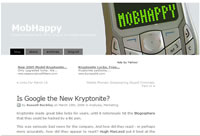 The Kryptonite comparison, summary: inhabitants of the InterWeb Blogland discovered you could steal a bike locked with Kryptonite even if all you had was a ball point pen, and Kryptonite dismissed those quaint Bloglanders as irrelevant. Well, yes; if you sell a product which is shown to be non-functional, you need to deal with the bad press.
The Kryptonite comparison, summary: inhabitants of the InterWeb Blogland discovered you could steal a bike locked with Kryptonite even if all you had was a ball point pen, and Kryptonite dismissed those quaint Bloglanders as irrelevant. Well, yes; if you sell a product which is shown to be non-functional, you need to deal with the bad press.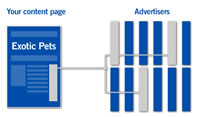 Now, I can see Google’s point. “What is this guy’s problem?” you might say. After all, most adverts on Web pages are there without the explicit consent of the site manager. One-click and other advert providers post adverts “on the fly” and track the individual user. Click on one advert for fast cars, and they’ll probably show you more next time you visit; and they don’t ring up the Web site manager and ask specific permission. They just download the advert. (Eventually. When you’re almost out of patience, and thinking of switching to Firefox and running Adblock. Another story…)
Now, I can see Google’s point. “What is this guy’s problem?” you might say. After all, most adverts on Web pages are there without the explicit consent of the site manager. One-click and other advert providers post adverts “on the fly” and track the individual user. Click on one advert for fast cars, and they’ll probably show you more next time you visit; and they don’t ring up the Web site manager and ask specific permission. They just download the advert. (Eventually. When you’re almost out of patience, and thinking of switching to Firefox and running Adblock. Another story…) Making blogging too easy seems to be making it hard. It may be coincidence, but one example of “too easy” blogging is the spam blog, or splog – and suddenly, there’s a rash of upset bloggers who have had their blogs blacked.
Making blogging too easy seems to be making it hard. It may be coincidence, but one example of “too easy” blogging is the spam blog, or splog – and suddenly, there’s a rash of upset bloggers who have had their blogs blacked. And a spam blog is something that doesn’t actually have any real content. It’s just links to trackback pointers for everybody else. The trouble is, all the signs of a spam blog are caused by the ease with which they are built. You just have to create the blog (two clicks) and then set up a robot that scours the web for new posts, and links to the trackbacks.
And a spam blog is something that doesn’t actually have any real content. It’s just links to trackback pointers for everybody else. The trouble is, all the signs of a spam blog are caused by the ease with which they are built. You just have to create the blog (two clicks) and then set up a robot that scours the web for new posts, and links to the trackbacks. I’m not saying that Qumana is what caused the blog to be blacked. I am saying that if it produces a series of random, unrelated tags to a single site, it’s going to fulfil one of the prime indicators of a splog. And when random, unrelated blog entries all get tagged “Qumana” whatever their subject, you have something so similar, it’s going to be quite hard to see what a blog provider can do to filter it.
I’m not saying that Qumana is what caused the blog to be blacked. I am saying that if it produces a series of random, unrelated tags to a single site, it’s going to fulfil one of the prime indicators of a splog. And when random, unrelated blog entries all get tagged “Qumana” whatever their subject, you have something so similar, it’s going to be quite hard to see what a blog provider can do to filter it. The US mobile companies are finally, really getting hold of delivering content of all sorts to mobile phones.
The US mobile companies are finally, really getting hold of delivering content of all sorts to mobile phones. As with all things to mobile phones, we’d love to see the figures as to who actually pays for access to this. A barrier which has yet to be consistently cracked.
As with all things to mobile phones, we’d love to see the figures as to who actually pays for access to this. A barrier which has yet to be consistently cracked. In what some are viewing as a challenge to Microsoft’s Office software, Google has dipped into its deep pockets and snapped up Upstartle, a small company best known for their online word-processor, Writely.
In what some are viewing as a challenge to Microsoft’s Office software, Google has dipped into its deep pockets and snapped up Upstartle, a small company best known for their online word-processor, Writely. Blog announcements
Blog announcements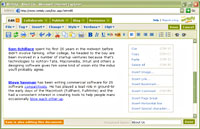 “That could provide enough revenues to pay for the acquisition in months and provide an interesting diversion to keep Microsoft looking over its shoulder,” said Bradshaw and Mitchell, adding that Writely’s integrated collaboration and blogging tools could also prove useful resources for Google’s hugely popular Blogger service.
“That could provide enough revenues to pay for the acquisition in months and provide an interesting diversion to keep Microsoft looking over its shoulder,” said Bradshaw and Mitchell, adding that Writely’s integrated collaboration and blogging tools could also prove useful resources for Google’s hugely popular Blogger service. “Press one if you’re a
“Press one if you’re a 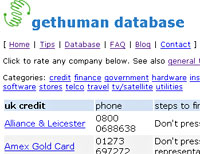 Here’s some example entries from the ‘gethuman’ UK database – obviously, we haven’t tested them all, but initial reports have been encouraging, but tell us how you got on.
Here’s some example entries from the ‘gethuman’ UK database – obviously, we haven’t tested them all, but initial reports have been encouraging, but tell us how you got on. There may be almost 76 million sites stuffed full of six billion pages of information vying for our attention on the Web, but it seems that most surfers only choose to visit six sites on a regular basis.
There may be almost 76 million sites stuffed full of six billion pages of information vying for our attention on the Web, but it seems that most surfers only choose to visit six sites on a regular basis. Sadly, it seems that the days of random surfing are coming to a close, with the vast majority of Web users (95 per cent) going online with a specific destination in mind.
Sadly, it seems that the days of random surfing are coming to a close, with the vast majority of Web users (95 per cent) going online with a specific destination in mind. Bringing together public services from across eleven Whitehall departments, visitors to Directgov can unearth a mountain of useful information and services, from renewing driving licences, car taxes or passports , locating local services like schools, childminders and recycling and even planning journeys on foot, by car or by public transport.
Bringing together public services from across eleven Whitehall departments, visitors to Directgov can unearth a mountain of useful information and services, from renewing driving licences, car taxes or passports , locating local services like schools, childminders and recycling and even planning journeys on foot, by car or by public transport. Almost 60 per cent of Britons rely on the Internet to do their banking, according to new research commissioned by the Alliance and Leicester bank.
Almost 60 per cent of Britons rely on the Internet to do their banking, according to new research commissioned by the Alliance and Leicester bank. Designed to cut down on identity theft and online fraud, the two-factor authentication compels users to provides two means of identification.
Designed to cut down on identity theft and online fraud, the two-factor authentication compels users to provides two means of identification. Other banks are also jumping on the security bandwagon, with Barclays running a new chip card reader trial involving 5,000 customers and staff, while Lloyds TSB is close to completing an exhaustive six-month test of a keyring type device.
Other banks are also jumping on the security bandwagon, with Barclays running a new chip card reader trial involving 5,000 customers and staff, while Lloyds TSB is close to completing an exhaustive six-month test of a keyring type device. The story we’ve
The story we’ve 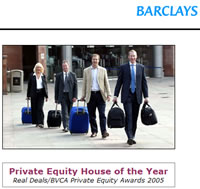 Now to us here at Digital Lifestyles, this threatened action seems to have a bit of a King Canute/70’s vibe about it. The truth of the matter, is that the competitive landscape has changed in telecommunications and broadcasting. BT is answerable to their city shareholders, and a move to tackle some of the entrenched attitudes within the company’s workforce might be looked on favourably by the number crunchers around the London stock exchange.
Now to us here at Digital Lifestyles, this threatened action seems to have a bit of a King Canute/70’s vibe about it. The truth of the matter, is that the competitive landscape has changed in telecommunications and broadcasting. BT is answerable to their city shareholders, and a move to tackle some of the entrenched attitudes within the company’s workforce might be looked on favourably by the number crunchers around the London stock exchange.